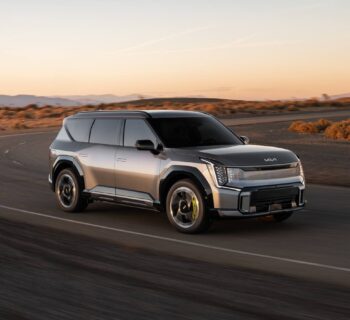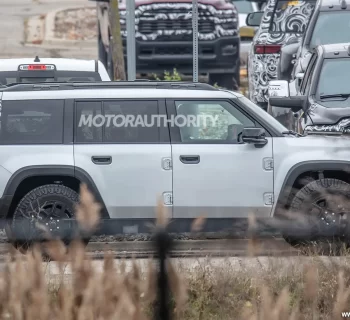- The Honda Prologue is shaping up to be one of the best-selling electric cars of 2024. It's quickly winning over Honda loyalists with its combination of range, pricing and specs.
- While it's a General Motors car underneath, it has several advantages those EVs don't have, including Apple CarPlay.
- Toyota, take note: people want great EVs from the Japanese automakers.
One of the more interesting—perhaps even baffling—studies that we've highlighted this year is the one that indicated most consumers are convinced that the Japanese automakers are the ones leading the way on electric vehicles. This, of course, is not true; while companies like Toyota, Honda and Nissan pioneered hybrid vehicles and do very well there (the first two, anyway) they are now playing catch-up when it comes to fully electric cars.
But people still think of those brands as "green" and trust their generally excellent reputations for reliability and quality. Put simply, people want good EVs from the Japanese automakers. And Honda is proving that to be true more and more every month.
As we have reported before, the all-electric Honda Prologue is proving to be the unexpected EV hit of 2024. The most recent data running through the end of October had the Prologue at 18,309 sales this year; it outsold the Ford Mustang Mach-E that month and has already bested the Nissan Ariya and Toyota bZ4X with year-to-date sales. Not bad at all for a total newcomer to the modern all-electric space.
While Honda has had a few U.S. EV offerings here and there like the old Fit Electric and Clarity Electric, the Prologue is Honda's first really serious entry into the space. The base version has almost 300 miles of EPA range, while the top one has 273 miles due to its all-wheel-drive and bigger wheels.

2024 Honda Prologue Elite
Under the skin, the Honda Prologue isn't even a Honda at all; it's a General Motors Ultium EV, made at GM's Ramos Arizpe, Mexico plant alongside its cousins the Chevy Blazer EV and Equinox EV. Then again, who cares? The specs are good and the whole package has lots of Honda touches, including its own take on the Android Automotive-based software system and—unlike most GM EVs—Apple CarPlay and Android Auto. If you can't live without those things, the Honda may be the one to get of the three.
In fact, the Prologue is the subject of a recent Bloomberg story about how Honda is turning its brand loyalists into EV fans for the first time:
MeLissa Jones, a 45-year-old software developer in Utah, isn’t overly concerned about air quality or climate change, but she does love a Honda. The Pacific Blue Prologue that she got in June is her 19th. “It’s not that I really like electric, it’s just that I wanted the new Honda to try it out,” Jones said. “We drove it as soon as (the dealer) got one in.”
[...] Much of the Prologue’s draw lies in just how unremarkable it is. Its starting price — before incentives or fancier options like all-wheel drive — is $47,400, just $400 less than the average market value of all US cars in September, according to Bloomberg Intelligence. Unlike many EVs, the Prologue’s performance will set no one’s hair on fire, but it does feature thoughtful and elevated details of the kind Honda evangelists have come to love. There’s a huge storage bin under the center console, for example, a massive sunroof, a supersized smartphone charging pad and a rash of buttons and knobs to preclude a flatscreen hunt-and-peck typical of the Tesla driving experience.
When asked why they chose a Prologue, Honda buyers cite trust in the brand followed by value, according to company spokeswoman Natalie Kumaratne. What’s more, almost two-thirds of Prologue buyers have owned a Honda before and nearly 80% have never had an EV.
Other car companies, take note: this is probably how EVs crack more mainstream adoption. People don't want spaceships, they want good specs and affordable prices from brands they trust. While Hyundai and Kia used the EV revolution as a chance to hit reset on their brand perceptions, there are tons of Honda CR-V and Toyota RAV4 buyers out there who just want the same cars they've always loved, minus the need for stops at a gas station. It's the way to win over those mainstream, next-wave EV drivers.

2024 Honda Prologue Elite interior
I'd argue that the above is why Toyota's bZ4X has done so well in certain months, especially when extra-generous deals and incentives get involved. But everything the bZ4X can do, the Prologue does better: it has more range, better fast-charging, better software and is, as Edmunds put it, "a better vehicle in every meaningful way." Even if it's not the best EV out there, it's clearly delivering what Honda owners want.
And I'd argue it's proving Toyota wrong right now. The bZ4X—which is a car I actually enjoy driving—has tremendous potential. Every time the InsideEVs staff tests the electric Toyota, we get tons of excited questions from curious onlookers; usually, it's some variation of "Toyota makes an electric vehicle?" People want EVs from brands they know and trust. If Toyota upped the specs on the bZ4X or maybe had a few other similar offerings in this space, it would be crushing it right now. Yet mere days after an election that could slow down the growth of the U.S. electric vehicle space, Toyota's executives are out there throwing water on California's EV goals. Maybe if they tried a little harder, this wouldn't be an issue for them. (And maybe a little intensified competition from Honda will get Toyota moving.)

Photo by: Jeff Perez / Motor1
2024 Honda Prologue Review
The point is that automakers have to meet people where they are, and the Prologue's steadily increasing sales in its very first year prove that the consumer may just be more "ready" than some companies think they are. This race is only going to heat up soon; all of them need to be thinking about whether they have the technology to meet the moment or not.
Contact the author: patrick.george@insideevs.com
Source link
Discover more from Autojunction
Subscribe to get the latest posts sent to your email.





